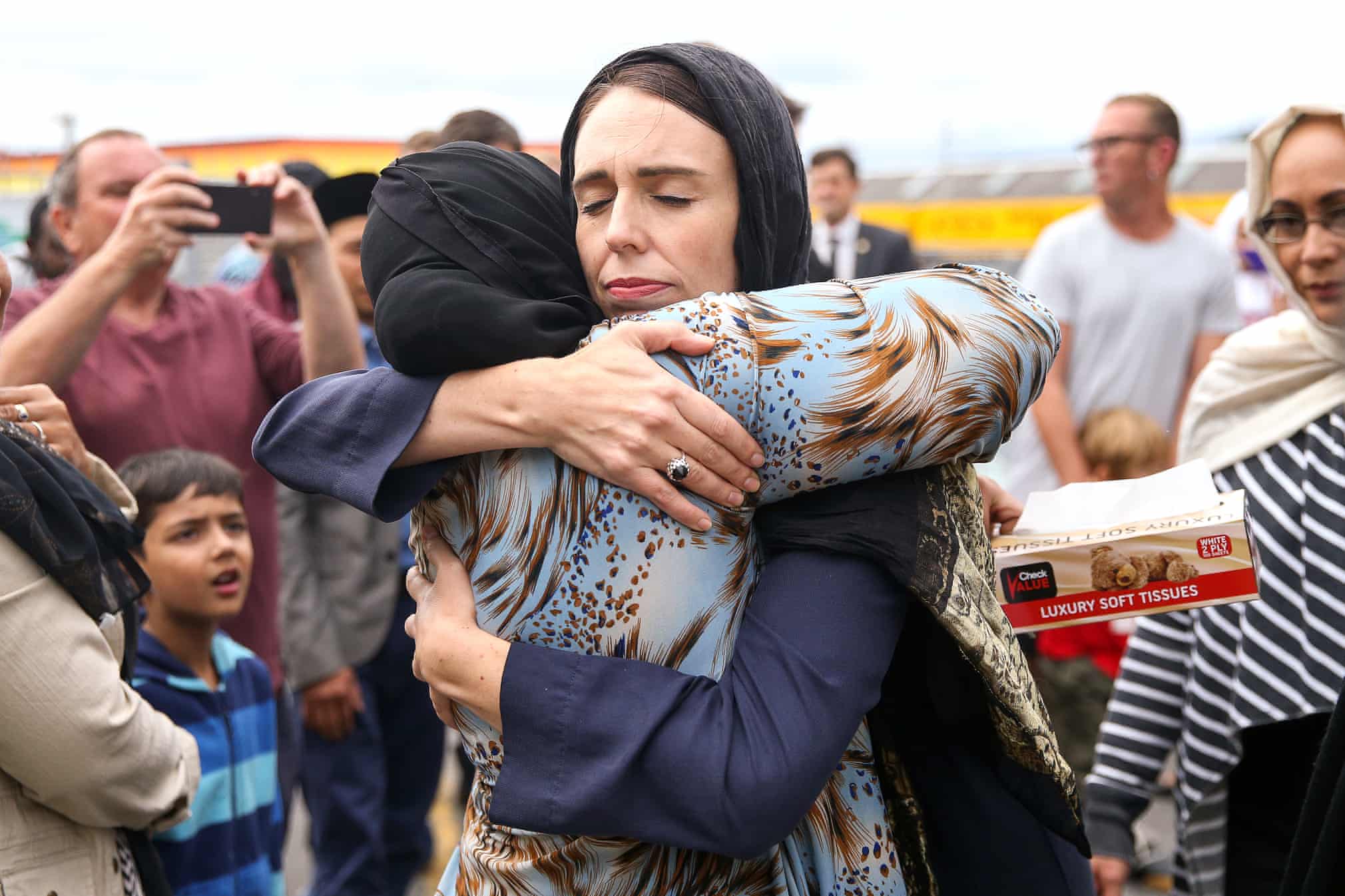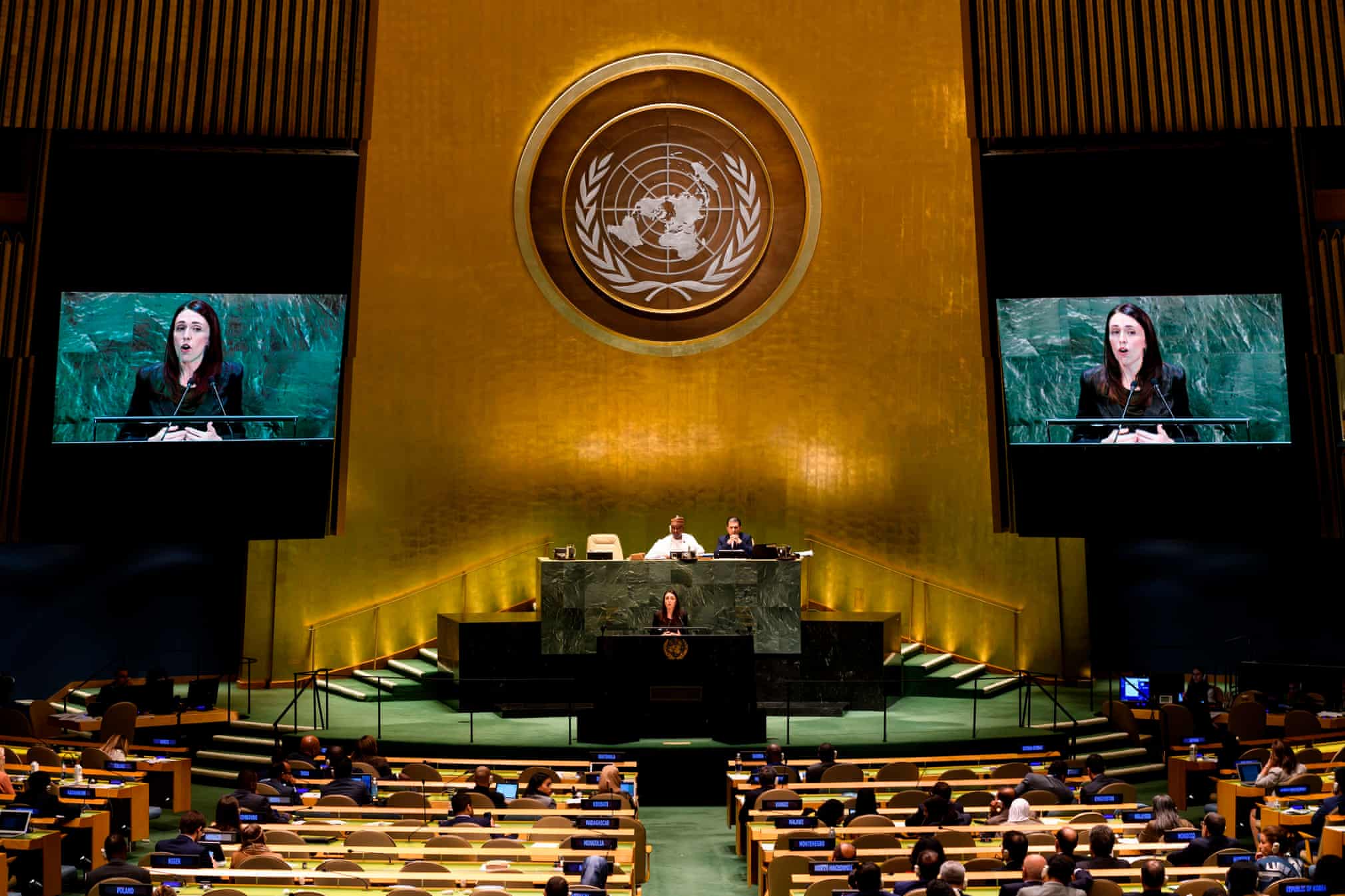A heart-felt congratulations and best wishes from the GCGI to the people of New Zealand for delivering such a resounding victory to prime minister Jacinda Arden
If you wish to make your country great, be like New Zealand
If you wish to know what is to be human, be like Jacinda Ardern
Jacinda Ardern:
Politics And Economics As If People Mattered To Focus On Empathy, Kindness and Well-Being:

Jacinda Ardern campaigns in Christchurch.- Photo: Kai Schwörer/Getty Images Via The Guardian
Prime minister Ardern, has inspired love, kindness, empathy, trust and the common good
Ask yourself this question: Has any political leader in your country, ever, spoken about love, empathy, kindness, trust and the common good?
There you have it! That’s why your country IS NOT GREAT!
‘Why New Zealand rejected populist ideas other nations have embraced’
Nota bene
To My Mind,This is the Key Lesson from New Zealand on How to Build a Better World
Everywhere I look, in countries, like Britain, US, Australia, India,..., who all claim to be the lands of ‘democracy’, I see the tragic consequences of embracing populism, arrogance and exceptionalism. But not in New Zealand. Why?
For sure there must be multiple reasons, as noted in the analysis below. But, one reason, for me, stands out: New Zealand emphatically rejected the poisonous and dirty works of the Murdoch’s Empire of Destruction:
“A huge reason that our politics is not so extremely polarised and so far out there is because we no longer have Murdoch-owned press in New Zealand, and it’s never taken a foothold.”
Murdoch's Mystery: Debunking the'Shadow State', The Empire of Corruption and Destruction
Our Rotten and Corrupted World: Murdoch’s Carnage and His Evil Empire

‘Labour’s historic win delivered Ardern a second term while voters
punished politicians who embraced populism.’
‘Jacinda Ardern, New Zealand’s Labour prime minister who was returned to power for a second term with a commanding majority, has often been hailed internationally as a foil to global surges in right-wing movements and the rise of strongmen such as Donald Trump and Brazil’s leader, Jair Bolsonaro.
But the historic victory of Ardern’s centre-left party on polling day – its best result in five decades, winning 64 of parliament’s 120 seats – was not the only measure by which New Zealand bucked global trends in its vote. The public also rejected some political hopefuls’ rallying cries to populism, conspiracy theories and scepticism about Covid-19.
The lack of traction gained by fringe or populist movements was due to the majority of New Zealanders’ long-term contentment with the direction the country was headed – which had persisted for more than 20 years, through both centre-right and centre-left governments, and prevented populist sentiment from taking root, analysts said.

Ardern hugs a mourner at the Kilbirnie mosque in Wellington on 17 March 2019,
after the mass shootings at two mosques in Christchurch. Photo: Hagen Hopkins Via The Guardian
“When you look at the numbers, New Zealanders have essentially been satisfied with their government since 1999,” said Stephen Mills, the head of UMR, Labour’s polling firm. That period had spanned two Labour and two centre-right National prime ministers – including Ardern – all of whom had led fairly moderate governments.
‘Basically positive’
Since 1991, UMR has asked poll respondents whether they felt the country was on the right track, with the response staying “basically positive” for the past 21 years, even during the global financial crisis and the Covid-19 pandemic, which has prompted the deepest recession in decades.
“People were deeply satisfied with the government,” during the peak of New Zealand’s coronavirus response, said Mills (Ardern has won global accolades for her decisions during the crisis, with New Zealand recording one of the world’s lowest death tolls).
“Records were set during Covid with that number in our polls, which is so weird when you think about it, during a pandemic,” Mills said.
David Farrar, the founder of Curia Market Research, National’s polling firm, also asks the “right or wrong direction” question and has recorded a “strong net positive” result since 2008 – meaning people mostly thought the country was traveling the right way.
“We have a functioning political system, we have one house of parliament and a neutral public service,” Farrar said.
In contrast, he said, the US had seen “net negative” results for most of the past 40 years, meaning people felt the country was headed in the wrong direction.
“That’s corrosive; 40 years of negative feeling,” Farrar said of the United States.

Ardern addresses the 74th session of the United Nations
general assembly on 24 September 2019 in New York City.- Photo: Johannes Eisele Via The Guardian
Murdoch-owned press
In Australia – where news outlets owned by Rupert Murdoch have been decried for driving confrontational politics and elevating populist sentiment – “right direction” polls were often negative too.
“A huge reason that our politics is not so extremely polarised and so far out there is because we no longer have Murdoch-owned press in New Zealand, and it’s never taken a foothold,” said David Cormack, the co-founder of a public relations firm and a former head of policy and communications for the left-leaning Green party.
In Britain, a majority had felt the country was headed in the wrong direction before 2016’s Brexit vote, in which 52% voted to leave the European Union, Farrar said.
Such sentiment allowed populist movements to gain momentum, Farrar said, something that contented New Zealanders had mostly avoided. It did not hurt that marginal views are often given short shrift in a country that views dramatic public displays as faintly embarrassing.
Advance NZ, a new party in the 2020 election that made its name by campaigning against Ardern’s Covid-19 restrictions, vaccinations, the United Nations, and 5G technology, won just 0.9% of the vote, attracting 21,000 ballots from the 2.4 million New Zealanders who cast them.
The result means the party will not enter parliament. Two days before the election, Facebook removed Advance NZ’s page from its platform for spreading Covid-19 misinformation.

Ardern meets first responders at the Whakatane fire station on 10 December 2019
following a volcanic eruption at White Island.- Photo: Via The Guardian
“They are cynical, opportunistic narcissists and this is absolutely what they deserved,” said Emma Wehipeihana, a political commentator for 1 News, in election night remarks that were widely applauded on social media…’- Continue to read
……
Why is the Economics of kindness the key to a new and better world, a world free of the selfishness of neoliberalism?
In my search to answer this timely question, I came across a wonderfully kind answer: I read and read it again, and thought that I could not do any better myself.
Opinion: An economics of kindness
Rt Hon Jacinda Ardern
Prime Minister, New Zealand

Photo:YouTube
'There’s a phrase often used to describe New Zealand. Even though we are a tiny country thousands of miles away from almost everywhere, we punch above our weight.
Ours was the first country where all women won the right to vote back in 1893. In 1938, we were one of the first to introduce a cradle-to-grave social welfare system that endures in some form to this day.
This tendency to push boundaries also means we are sometimes the first to learn valuable lessons. Starting in 1984, New Zealand went further and faster than nearly any country in embracing the prevailing neo-liberal economic experiment. We slashed the top tax rate, dramatically cut public spending, removed regulations that were said to hamper business, and vastly reduced welfare benefits paid to the sick, those caring for children and the unemployed.
Economists and policymakers in many other countries pointed to New Zealand as a poster child for market-based reforms which were all too frequently accompanied by abrupt cuts to the social safety net.
Within 20 years, my nation lost its status as one of the most equal countries in the OECD. While incomes at the top doubled and gross domestic product grew steadily, incomes at the bottom stagnated and child poverty more than doubled. Some citizens were richer in cash, but the country was poorer in many other ways.
I was a child back then, but the consequences of this shift are etched into my memory and my politics. Kids in the small rural town I was living in at the time weren’t born into a decade of hope and opportunity, but one of inequality where users had to pay for basic services.
This experience wasn’t limited to New Zealand. It happened in many countries. Around the world, there is now increasing frustration over economies that see disproportionate benefits go to one group, and leave others behind. They are not only perpetuating unfairness but also hampering their overall growth potential and, increasingly, posing a threat to our democracies.
We have seen politicians and governments of all stripes respond to such disparities by rejecting the institutions and global systems that are believed to have produced it. I see how we reached this point, but I reject the idea that the only alternative is isolationism and the abandonment of global institutions.
We don’t need to start again, but we do need to change the way we do things. In May, my government will present the world’s first “wellbeing budget”. This is not a concept we came up with ourselves. The OECD and the IMF have, for a while now, have urged countries to look beyond a strong balance sheet and a strong economy to redefine success. We must focus specifically on living standards and human, social, and natural capital when we set targets and track progress. In our next budget, we will set five priorities each deliberately focused on long-term intergenerational change.
As an example, one priority will be to support the mental wellbeing of all New Zealanders, with a special focus on under 24-year-olds. From a purely economic perspective, there are clear benefits to supporting positive mental wellbeing including enhanced productivity. From a kindness perspective, the modern age places huge stresses on young people, which affects their ability to live full, meaningful lives. Confronting this will make us a better country.
This isn’t woolly but a well-rounded economic approach — the same kind we will use to confront the challenges posed by climate change, digital transformation, social exclusion, poor health, housing and domestic violence. As leaders, we should not be afraid to reject the status quo, especially when an entire generation is doing just that.
At a time when the international rules-based order is under strain, when leaders around the world are grappling with understandably dissatisfied constituencies, I hope this wellbeing approach could provide a model which others in turn might look to. I wholeheartedly believe that more compassionate domestic policies are a compelling alternative to the false promise of protectionism and isolation. Now we have a chance to prove it.
But change of this scale requires us to look beyond three and four year electoral cycles. We must accept that the race to grow our economies makes us all poorer if it comes at the cost of our environment, or leaves our people behind. It requires what in the Māori language is called kaitiakitanga, or guardianship.
We in New Zealand hope to, once again punch above our weight by forging a new economic system based on this powerful concept — one that is successful, but one that is also kind.'- This article was originally published by the Financial Times on 22 January 2019.
Read more on Economics of Kindness
Why Love, Trust, Respect and Gratitude Trumps Economics: Together for the Common Good
Economic Growth: The Index of Misery
Small is Beautiful: The Wisdom of E.F. Schumacher
See also: Thank you New Zealand for your humanity welcoming Behrouz who had no friends but the mountains
Below see examples of the moral and spiritual bankruptcy of Murdochism and Neoliberalism:
The Emperors with no clothes: The Madness of King Donald- A Modern Day King John
The Mother of all Heists: ‘The Neoliberal Looting of America’
The Myth of the ‘Promised’ Land
